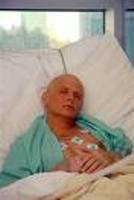Exiled Russians don't answer key questions in Litvinenko probe

A Russia investigator said in an interview published Monday that two exiled Kremlin adversaries refused to provide answer key questions posed by Russian authorities probing the poisoning death of former security agent Alexander Litvinenko.
Tycoon Boris Berezovsky and Chechen rebel envoy Akhmed Zakayev answered fewer than half the questions they were asked in hours-long sessions late last month, the head of a team of Russian investigators who interviewed them last month in London, Andrei Mayorov, told the official newspaper Rossiyskaya Gazeta.
"In a word, they did not answer the most key questions," said Mayorov.
His comments were part of a back-and-forth of accusations and insinuations over the death of Litvinenko, a Kremlin critic and Berezovsky associate who died in a London hospital in November following a dose of radioactive polonium-210.
Berezovsky has echoed Litvinenko's deathbed accusation that blamed Russian President Vladimir Putin for his death. Russia's chief prosecutor has said it was possible Russians living abroad killed Litvinenko, and pro-Kremlin lawmakers and state-controlled media have said Berezovsky could have been behind his death.
Mayorov made no accusations and referred to Berezovsky and Zakayev as witnesses. But he told Rossiyskaya Gazeta that Berezovsky declined to answer questions about his financial and business ties to Litvinenko, adding that "Litvinenko, especially recently, in many ways depended on (Berezovsky)."
Russian media have speculated that a falling-out between Berezovsky and Litvinenko could have led to his death; some have alleged that Berezovsky had reduced an allowance they claimed he was paying Litvinenko, forcing him to find other sources of revenue that could have got him into trouble.
Mayorov said that Berezovsky also refused to talk about how Litvinenko had been making a living recently, or about "certain people" he said Russian investigators believe met with Litvinenko shortly before his poisoning.
"All this important information, which doubtless would help the investigation, we could have received from Berezovsky and Zakayev, who called themselves the deceased's best friends. But they said nothing," said Mayorov.
Later in the interview, he again suggested that financial ties between Litvinenko and Berezovsky could have led to the poisoning, saying that some of the theories about the case are interconnected. "This is precisely why Berezovsky was asked questions about his financial dealings with Litvinenko."
One of the wealthiest of the Russian tycoons who amassed fortunes in shadowy privatization deals in the 1990s, Berezovsky was an influential Kremlin insider but fell out with President Vladimir Putin in 2000 and fled to England to avoid prosecution on what he said were politically motivated charges of financial misdeeds.
After the questioning, Berezovsky said that he was asked about Litvinenko's financial status but also suggested that the Russian investigators were seeking information about his own finances. Mayorov said that all the questions to Berezovsky - more than 100 - "involved exclusively the death of Litvinenko."
Mayorov said that Berezovsky and Zakayev were questioned simultaneously and that he was present for the questioning of Zakayev. British authorities have said they conducted the interviews on behalf of Russian investigators - the same format as when British investigators came to Moscow for their probe in December.
Among those questioned by British authorities were Andrei Lugovoi and Dmitry Kovtun, two Russians with military and security backgrounds who met with Litvinenko in London the day he said he fell ill. British authorities have filed no charges.
Subscribe to Pravda.Ru Telegram channel, Facebook, RSS!





